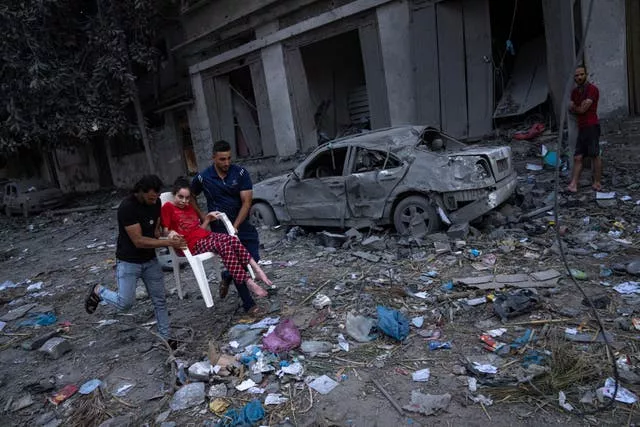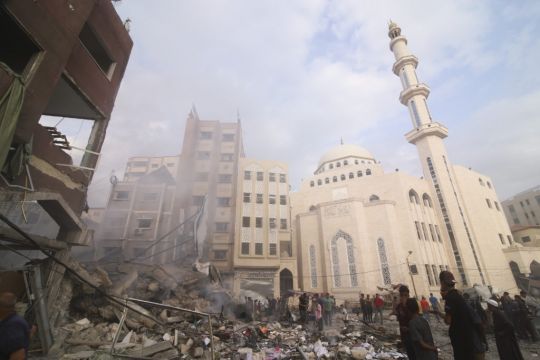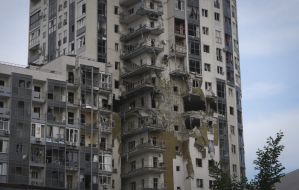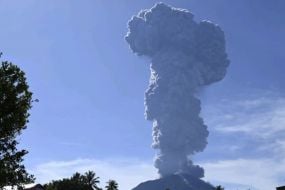Palestinians in the sealed-off Gaza Strip were scrambling to find safety, as Israeli strikes demolished entire neighbourhoods, hospitals ran low on supplies and a power blackout was expected within hours, further deepening the misery of a war sparked by a deadly mass incursion of Hamas militants.
Airstrikes smashed entire city blocks to rubble in the tiny coastal enclave and left unknown numbers of bodies beneath mounds of debris.
The bombardment raged on even though militants are holding an estimated 150 people — soldiers, men, women, children and older adults — who were taken into Gaza during the weekend attack.
Israel has vowed unprecedented retaliation against the Hamas militant group ruling the Palestinian territory after its fighters stormed through the border fence on Saturday and shot hundreds of Israelis in their homes, on the streets and at an outdoor music festival.

The war, which has already claimed at least 2,200 lives on both sides, is expected to escalate — and compound the misery of people living in Gaza, where basic necessities and electricity were already in short supply.
Israel has stopped the entry of food, water, fuel and medicine into the territory — a 25-mile-long (40km) strip of land wedged among Israel, Egypt and the Mediterranean Sea that is home to 2.3 million Palestinians. The sole remaining access from Egypt was shut down on Tuesday after airstrikes hit near the border crossing.
As Palestinians crowded into UN schools and a shrinking number of safe neighbourhoods, humanitarian groups pleaded for the creation of corridors to get aid in, warning that hospitals overwhelmed with wounded people were running out of supplies.
“There is no safe place in Gaza right now,” journalist Hasan Jabar said after three Palestinian journalists were killed in the bombardment of a city centre neighbourhood home to government ministries, media offices and hotels. “I am genuinely afraid for my life.”
Gaza’s power authority said its sole power plant would run out of fuel within hours, leaving the territory without electricity after Israel cut off supplies.
Palestinians there have long relied on generators to power homes, offices and hospitals, but have no way of importing fuel for those either.

The UN’s World Health Organisation said that supplies it had pre-positioned for seven hospitals had already run out amid the flood of wounded.
The head of the medical aid group Doctors Without Borders said surgical equipment, antibiotics, fuel and other supplies were running out at two hospitals it runs in Gaza.
In one hospital “we consumed three weeks’ worth of emergency stock in three days, partly due to 50 patients coming in at once,” Matthias Kannes, the aid group’s head of mission in Gaza, said on Wednesday.
He said the territory’s biggest hospital, Al-Shifa, only had enough fuel for three days.
Israel has mobilised 360,000 reservists and appears increasingly likely to launch a ground offensive into Gaza, with its government under intense pressure from the public to topple Hamas, which has ruled the territory since 2007.
That goal was considered unachievable in the past because it would require a reoccupation of the Gaza Strip, at least temporarily.

“We will not allow a reality in which Israeli children are murdered,” Israeli defence minister Yoav Gallant said in a meeting with soldiers near the southern border on Tuesday.
“I have removed every restriction — we will eliminate anyone who fights us, and use every measure at our disposal.”
Meanwhile, exchanges of fire over Israel’s northern borders with militants in Lebanon and Syria pointed to the risk of an expanded regional conflict.
US president Joe Biden warned other countries and armed groups on Tuesday against entering the conflict.
The US is already rushing munitions and military equipment to Israel and has deployed a carrier strike group to the eastern Mediterranean as deterrence.
Israeli airstrikes late on Tuesday struck the family house of Mohammed Deif, the leader of Hamas’ military wing, killing his father, brother and at least two other relatives in the southern town of Khan Younis, senior Hamas official Bassem Naim told The Associated Press.

Deif has never been seen in public and his whereabouts are unknown.
In a new tactic, Israel is warning civilians to evacuate neighbourhood after neighbourhood, and then inflicting devastation, in what could be a prelude to a ground offensive.
The Hamas-run interior ministry said Israeli airstrikes had destroyed the entire al-Karama neighborhood in Gaza City, with a “large number” of people killed or wounded. It said medical teams were unable to reach the area because all roads to it were destroyed. Rescue officials said they had struggled to enter other areas as well.
In another neighbourhood, Palestinian Civil Defence forces pulled Abdullah Musleh out of his basement together with 30 others after their apartment building was flattened.
On Tuesday afternoon, Hamas fired barrages of rockets toward the southern Israeli city of Ashkelon and Tel Aviv. There were no immediate reports of casualties. On Tuesday night, a group of militants entered an industrial zone in Ashkelon, sparking a gun fight with Israeli troops, the military said. Three militants were killed, and troops were searching the area for others.
Four previous rounds of Israel-Hamas fighting between 2008 and 2021 all ended inconclusively, with Hamas battered but still in control.
“The objective is for this war to end very differently from all of the previous rounds. There has to be a clear victory,” said Chuck Freilich, a former deputy national security adviser in Israel.
“Whatever has to be done to fundamentally change the situation will have to be done.”

Hamas officials have said they planned for all possibilities, including a punishing Israeli escalation. Desperation has grown among Palestinians, many of whom see nothing to lose under unending Israeli military occupation and increasing settlements in the West Bank, a 16-year-long blockade in Gaza and what they see as the world’s apathy.
Days of clashes between rock-throwing Palestinians and Israeli forces in the West Bank have left 15 Palestinians dead, but Israel has clamped down heavily on the territory, preventing movement between communities. The violence also spread into east Jerusalem, where Israeli police said they killed two Palestinians who hurled stones at police late on Tuesday.
The Israeli military said more than 1,200 people, including 155 soldiers, have been killed in Israel, a toll unseen since the 1973 war with Egypt and Syria that lasted weeks. In Gaza, 1,055 people have been killed, including 260 children and 230 women, according to authorities there; Israel says hundreds of Hamas fighters are among them. Thousands have been wounded on both sides.
The bodies of roughly 1,500 Hamas militants were found on Israeli territory, the military said. It was not clear whether those numbers overlapped with deaths reported by Palestinian authorities.
In Gaza, more than 250,000 people have fled their homes, the UN said, the most since a 2014 air and ground offensive by Israel uprooted about 400,000.
The vast majority were sheltering in schools run by the UN agency for Palestinian refugees. Damage to three water and sanitation sites had cut off services to 400,000 people, the UN said.
Tens of thousands of people in southern Israel have been evacuated since Sunday.







